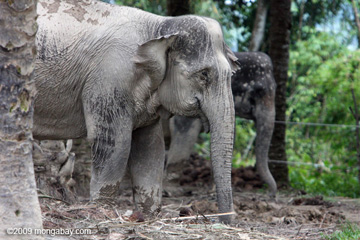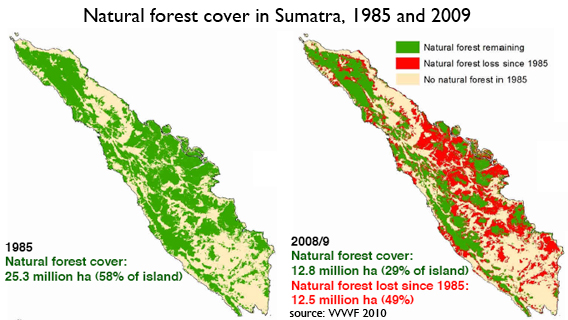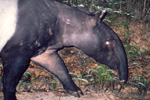Local conservationists are urging the Indonesian government to halt the destruction of a 42,000 hectare forest in the renowned Bukit Tigapuluh Forest Landscape for a pulpwood plantation. According to researchers, the forest concession—owned by PT Lestari Asri Jaya, a subsidiary of Barito Pacific Group—contains the last population of Sumatran elephants (Elephas maximus sumatranus) in the Bukit Tigapuluh and approximately 5% of the island’s total population. In a letter being sent to the Ministry of Forests, conservationists write that the destruction of the forest “would immediately lead to local extinction of elephants in Bukit Tigapuluh”. They argue that given its ecological importance, the PT Lestari Asri Jaya forest concession should be placed under permanent protection.
The Bukit Tigapuluh Forest Landscape is also one of the last stands for two other endemic flagship mammals in Sumatra: the Sumatran tiger and the Sumatran orangutan, both of which are listed as Critically Endangered on the IUCN Red List. While a portion of the Bukit Tigapuluh is protected as a national park, forests surrounding the park, which have already been selectively logged, are now under threat of total clearance.
 Sumatran elephants in a conservation program to reduce human-elephant conflict. Photo by: Rhett A. Butler, 2009. |
In the letter conservationists argue that allowing this concession to be cleared violates a number of Indonesian regulations, including Action Plans to save the Sumatran elephant, tiger, and orangutan from extinction.
But that’s not all. The letter also states that the conversion of this forest contradicts “the Indonesian President’s commitment to reduce the country’s carbon emissions” and Indonesia’s $1 billion deal with Norway to produce “significant reductions in greenhouse gas emissions from deforestation and forest degradation”.
Locally, the clearance would undercut the state government’s desire to host a pilot project in the REDD+ (Reducing Emissions from Deforestation and Forest Degradation) program.
Forest loss has been a flashpoint in the Bukit Tigapuluh Forest Landscape for years. For better governance, the letter states that a “perfect alternative” is available, referring to the The Bukit Tigapuluh Ecosystem Conservation Implementation Plan, which was crafted by numerous stakeholders including district governments, the Bukit Tigapuluh National Park, and several NGOs last year.
The fate facing the PT Lestari Asri Jaya forest concession—and the endangered species that inhabit it—is indicative of recent deforestation across Sumatra. According to a detailed report released by WWF, the island of Sumatra—Indonesia’s largest—has lost half of its forest cover since 1985. Approximately, half a million hectares (larger than Rhode Island) of forest have been cleared annually, mostly for industrial palm oil and wood-paper plantations.
The Sumatran elephant, a subspecies of the Asian elephant (Elephas maximus), is down to less than 3,000 individuals. The subspecies is threatened by habitat loss, poaching and conflict with humans.

Related articles
Pulp plantations destroying Sumatra’s rainforests

(11/30/2010) Indonesia’s push to become the world’s largest supplier of palm oil and a major pulp and paper exporter has taken a heavy toll on the rainforests and peatlands of Sumatra, reveals a new assessment of the island’s forest cover by WWF. The assessment, based on analysis of satellite imagery, shows Sumatra has lost nearly half of its natural forest cover since 1985. The island’s forests were cleared and converted at a rate of 542,000 hectares, or 2.1 percent, per year. More than 80 percent of forest loss occurred in lowland areas, where the most biodiverse and carbon-dense ecosystems are found.
Indonesian logging company makes ‘deceptive’ claims on carbon conservation project
(11/24/2010) A major wood-pulp company is misleading the public over its commitment to reducing greenhouse gas emissions through a carbon conservation project in Sumatra, claims Greenomics, an Indonesian activist group.
Photos: surprises discovered in tiny forest fragment surrounded by palm oil

(11/10/2010) Researchers have uncovered an astounding number of species in a tiny protected forest fragment surrounded on all side by palm oil plantations in the Indonesian island of Sumatra. Researchers with the Zoological Society of London (ZSL), Queen Mary, University of London and the Durrell Institute of Conservation and Ecology (DICE – University of Kent) recorded sun bear (Helarctos malayanus), Malayan tapir (Tapirus indicus), the banded langur (Presbytis femoralis), and agile gibbons (Hylobates agilis), but most notable, was the first record ever of the Ridley’s leaf-nosed bat (Hipposideros ridleyi) in Sumatra. The discoveries highlight the importance of preserving even small forest fragments surrounded by agriculture.